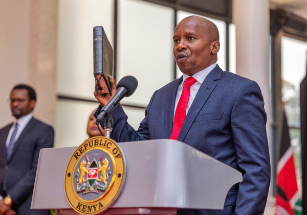
The question presented is the legal necessity of determining qualification to the Office of Deputy President in the constitution which should be a function of the IEBC.
It is further argued that the lack of commissioners in the IEBC is a setback to Professor Kindiki's nomination, as his suitability should first be assessed by the Commission.
This function of replacing a Deputy President under article 148 of the constitution did not include the IEBC but the National Assembly in approving the nomination.
Every good legal interpretation begins from the text of the Constitution. On the above issue, the language and legislative history demonstrated that the constitution intended for the replacement to be a separate path from that of the election of the Deputy President and to be distinct categories from election and nomination under the IEBC.
The appointment to be approved by Parliament did not intend for the IEBC to have a direct role concerning vetting the nominee's qualifications but intended that duty to be materially done by the National Assembly who are to approve the nomination.
Section 148 of the constitution and the 2011 Public Appointments Parliamentary Approval Act is a meaningful guide.
The National Assembly's role in approving the President nominee of the Deputy President has always stood side by side with the rest of the role of parliament to approve all nominations to the state and public office nominated by the President before they are appointed by the President.
What does alarm me about the above issue is that social media memes and politicized sound bites linked to this important debate sometimes pass for legal opinions.
Regardless of our political sympathies, we should avoid emotionally potent oversimplification of some of the issues that are just meant to create morale.
We should not stop doing the difficult work of seeking a deeper understanding of an issue, just because the issue of impeachment is politically sensitive, legally complex, combative and emotionally fraught.
Especially when one sees impeachment as a matter of self-interest, with the view that is common with Trump that when they come after me, they’re really coming after you.
When it comes to questions of appointment to state and public offices, both the constitution and legislation recognize the right and role of the National Assembly to approve nominees that align with the requirements for the job nominated.
In this article, I want to clarify the role of parliament in voting for the Deputy President replacement nominee appointed by the President.
Therefore the absence of the vetting of the Deputy President qualifications by IEBC like during the election is not an anomaly. Far less attention has been paid to the established constitutional safeguards on the National Assembly to examine suitability, competence and approval of all presidential appointments Parliamentary Approval Act of 2011.
Certainly, as a way of comparison, we have seen other presidential appointees including the cabinet, constitutional commissions, etc under Article 95 and the public appointments approval.
Certainly, the Constitution begins with a simple premise running like a golden thread and at the heart of it is the role of parliament in oversight. This is a thread that links all the appointments to state and public offices, which is the approval by parliament.
I can not think of a role well clarified in the constitution than the role of the National Assembly in approving the appointment and nomination by the President. For a nominated Deputy President, it is the Parliament to determine their suitability and not the IEBC.
Look at the role of the National Assembly Act under Article 7 on Issues for consideration before the approval is the specific qualifications for the job against the nominees.
It provides that the issues for consideration by the relevant House of Parliament in relation to any nomination shall be—
(a) the procedure used to arrive at the nominee;
(b) any constitutional or statutory requirements relating to the office in question; and
(c) the suitability of the nominee for the appointment proposed having regard to whether the nominee’s abilities, experience and qualities meet the needs of the body to which the nomination is made.
Parliament has a role in exercising its oversight role in defence of the Constitution and other laws of the land, Kenyans have made it clear that they shall not hesitate to exercise the rights enshrined in Article 1 of the Constitution.
Indeed, Parliament is an avenue of questions of integrity and often the public has called on the National Assembly to fully exercise its oversight role at the vetting hearings.
And when it comes to questions of appointment, the House should consider various provisions of the Constitution, particularly Chapter Six on Leadership and Integrity.
It is very important to remember the Role of Parliament through section 96 of the constitution to show why approval of appointments and their vetting through parliament is an important aspect of their appointments.
Among some relevant provisions is that the legislative authority of the Republic is derived from the people and, at the national level, is vested in and exercised by Parliament.
One needs to be attuned with the role of parliament in oversight of the public office holders and state officers on behalf of the people and if necessary removing them from those offices.
The above interpretation is logical because it flows with Article 152 which provides that the President shall nominate and, with the approval of the National Assembly, appoint Cabinet Secretaries.
The President is to consider the qualifications provided by law subject to the approval and determination of the National Assembly.
The article concludes that the body of the Cabinet which is composed of the cabinet, the Deputy President and the President can assume office by swearing or affirming faithfulness to the people and the Republic of Kenya and obedience to this Constitution, before the President and in accordance with the Third Schedule.
Dr Duncan Ojwang, constitutional law lecturer

 © The Star 2024. All rights reserved
© The Star 2024. All rights reserved